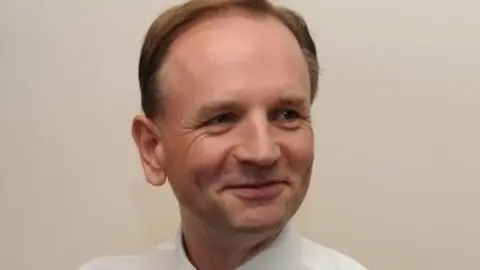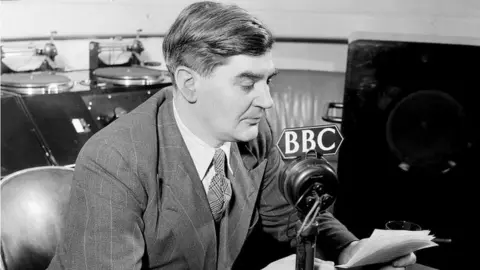Simon Stevens: How heavy hitter changed the NHS
 Reuters
ReutersThink like a patient, act like a taxpayer. That was the mantra of the head of NHS England.
There is even a sign, made by one of his children, in his office as a reminder.
Sir Simon Stevens oversees an annual budget of about £130bn - but this does not stop him monitoring the smaller change.
He took a pay cut compared with his predecessor, when starting his role, and banned first-class rail travel among NHS management.
Sir Simon will quit his role in late July, after just over seven years.
It has been a tumultuous time for the NHS in England, culminating in an unprecedented pandemic and then the biggest vaccination programme in the history of the health service.
But Sir Simon won't just be remembered for leading the service through those extraordinary months. He was also a central player in health policy for much of his career.
The respected editor of Health Service Journal, Alastair McLellan, went so far as to say Sir Simon had been the most important figure in NHS history since its founder, Aneurin Bevan.
So what do we know about the holder of a position with more power to affect people's lives than arguably any cabinet minister apart from the prime minister and the chancellor?
Head for detail
All agree he is fiercely bright and a master of strategic health policy as well as the bureaucratic complexity and alphabet soup of NHS organisations.
He can at times, though, become immersed in detail and was known for wanting to check the fine print of press releases before allowing them to go out.
Sir Simon joined the NHS as a graduate trainee. His early assignments included working on a maternity ward and running a mortuary which allowed him to quip, in later years, this showed the NHS was a true "cradle-to-grave service".
He served as an adviser to Labour health secretaries and then Tony Blair. And this honed his political skills, widely acknowledged to be as formidable as any MP or minister's. But it also gave him experience of managing the NHS money trail, as Labour greatly increased health spending.

Arriving as boss of NHS England in 2014, during the austerity years of the coalition, he knew he had to fight for more resources.
And he did not leave it to the then Health Secretary, Jeremy Hunt, to plead for extra funding but instead formed his own alliance with the Chancellor, George Osborne.
Rarely in modern times can the Treasury have found itself negotiating directly with the head of a government body such as the NHS rather than the cabinet minister responsible.
What's more, Sir Simon hammered out a five-year deal, a much longer timeframe than Whitehall departments managed.
Efficiency savings
But it was not long before the spending plan faced criticism from health managers and commentators.
And some argued Sir Simon should have held out for more money and not agreed to daunting efficiency savings.
Those close to him answered this was realpolitik and compromise was needed to secure a long-term settlement at a time when other government departments were facing strict spending curbs.
But demand for patient care rose faster than expected and health budgets in England again came under strain.
Brexit intervention
This time, Sir Simon took a bolder stance.
Just a fortnight before the Budget in the autumn of 2017, he made a speech citing the claim on the side of the Brexit campaign battle bus that leaving the EU would free up £350m a week for the NHS.
And he called for this commitment to be honoured.
The stakes could not be higher. Sir Simon was risking his job with such a political intervention.
The then Chancellor, Philip Hammond, was known to be furious.
But the NHS chief had his way and the Prime Minister, Theresa May, agreed to another five-year funding plan.
 PA Media
PA MediaThink tanks, though, noted the deal looked generous only because the previous few years had seen historically low increases.
But controversial changes introduced under the Conservative Health Secretary Andrew Lansley had given NHS England more autonomy than its predecessor organisations.
And Sir Simon used this to his advantage - it seemed as if he was running his own empire at a distance from the Department of Health, sometimes to the frustration of ministers and civil servants.
But it was clear he had little faith in the rest of the changes, which included requirements for NHS organisations to put contracts out to tender.
And he pushed for the scrapping of much of the change framework, advice eventually acted on by the government.
Political flak
Sir Simon had long argued the need for health and social care to be brought closer together.
And he quietly encouraged local NHS and care leaders to ignore the fine print of the existing legislation and join forces in integrated care systems focusing more on the needs of patients.
He also prioritised mental health in longer-term strategies.
Sir Simon sometimes appeared to act like a politician running a major department.
But he always seemed to know when to keep his head down as political flak was flying.
Extraordinary surge
In the early stages of the pandemic, his public appearances were rare.
As the first Covid-19 wave subsided, he was able, rightly, to say the NHS had coped in the face of the extraordinary surge in Covid-19 patient numbers.
But the emergency Nightingale Hospitals, created from scratch at large expense, were barely used.
And this was something Sir Simon and his senior NHS colleagues were less willing to talk about.
Covid legacy
With hopes of pulling through the pandemic placed in the rollout of vaccines, the pressure to deliver was immense.
In England, that task fell to Sir Simon and an army of NHS staff.
Downing Street was happy to let it be known he would be in charge and, by inference, would carry the can if things went wrong.
So the fact it was a triumph of logistics and on a scale never seen before in the UK can to a large extent be put down to NHS England's chief executive and his colleagues.
But Sir Simon will depart with a legacy of Covid-19 that will have to be dealt with by his successor.
Staff shortages
Cancellations of non-urgent surgery during the first and second Covid-19 waves have left nearly 400,000 patients in England waiting more than a year for operations such as hip and knee replacements.
The NHS workforce is exhausted and there are fears of increasing staff shortages if departures from the service increase.
Sir Simon will be elevated to the House of Lords when he leaves NHS England. And there is the option of taking another big job away from the UK.
But like all health and political leaders, he will need to say his piece at the Covid-19 public inquiry, whenever that comes.
